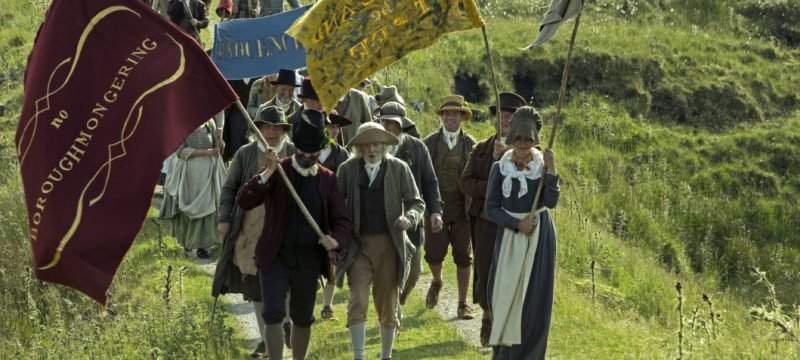PETERLOO
Written and directed by Mike Leigh
155 minutes, rated M
Selected cinemas
★★★★
Mike Leigh's remarkable new film kicks off with a bang: nothing less than a glimpse of the battle of Waterloo. While cannons blast away, the camera singles out a young English bugler, Joseph (David Moorst) in the midst of the noise and smoke, unsure how to proceed or where to turn.
This is a far cry from the usual intimate scale of Leigh's cinema. Still, nothing could be more like him than to show a world-shaking historical event from the perspective of a seemingly unimportant character – and to turn this character's stumbling, bandy-legged gait into a spectacle in itself.
Peterloo is the third Leigh film set in 19th-century England, a foreign country where he nonetheless feels at home: the previous two were Topsy-Turvy, about the premiere of Gilbert and Sullivan's The Mikado, and Mr Turner, about the painter of the title.
Once again, Leigh's subject is drawn from history: the Peterloo Massacre of 1819, in which government militias charged on a crowd of Manchester workers who had peacefully assembled to demand an extension of voting rights.
Given Leigh's politics, Peterloo might be expected to proceed on straightforward agitprop lines –which to some degree is what happens, especially in the wilfully caricatured scenes that show members of the ruling class gleefully sneering at those beneath.
Yet this is not the kind of film that might have been made on the same subject by a conventional social realist such as Ken Loach, who is sometimes lumped with Leigh on the assumption they're equally stout champions of the British people.
Leigh's storytelling is peculiarly his own. It's humanist and anti-humanist at once, in a mode that might be called “grotesque realism”. A squint, a speech impediment, an oddly rigid stance: such physical traits serve to define his characters from the moment we meet them, betraying a history of suffering on the one hand or self-indulgence on the other.
Crucial to Leigh's very British notion of democracy is a commitment to showing people as they really are – or as he sees them, in all their knobbly imperfections. Crucial, too, is the fact that even an epic like Peterloo remains a film without heroes: there are distinctive personalities by the dozen, but no single figure is raised above the crowd.
At the outset, Leigh teases us on this score, letting us believe the story might be told through the eyes of the shellshocked Joseph, or those of an army officer named John Byng (Alastair McKenzie) who's dispatched to the north to help keep the peace.
But both prove to be minor players in an episodic narrative that skips from one set of characters to another – a typical tactic for Leigh, which he pushes even further than usual.
Many of the film's vignettes involve public meetings of various kinds, with as much attention given to the listeners, male and female, as to those granted permission to speak. By its final hour Peterloo has assumed the shape of a companion piece to Topsy-Turvy, focused once again on the trials and tribulations of putting on a show.
So we get the rich social comedy of the urbane radical orator Henry Hunt (Rory Kinnear) being summoned from London to the backwater of Manchester where he's forced to stay a week longer than planned, not to mention having to submit to indignities such as having his portrait painted by a local dauber.
One of the best scenes depicts a heated debate between Hunt and local reformer Samuel Bamford (Neil Bell), who seems an uncouth ratbag next to the polished visitor. Respectfully but forcefully, Bamford argues that plans for the upcoming mass meeting should factor in the possibility of violence – a clash between two classes, two notions of political struggle, and two singular personalities who remain stubbornly themselves.
At such high points, Leigh is able to keep multiple meanings in balance, not enforcing one interpretation but encouraging us to absorb as much as we can. For all his British distrust of theory, he has mulled everything over and expects us to do the same – to decide, for instance, whether a simple gesture of humanity near the film's climax might not tell us more than many of its wordy speeches.
Source: Read Full Article
